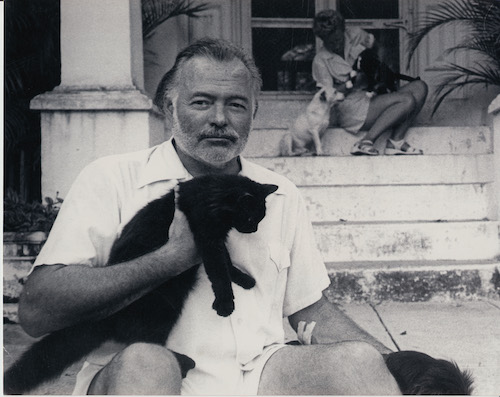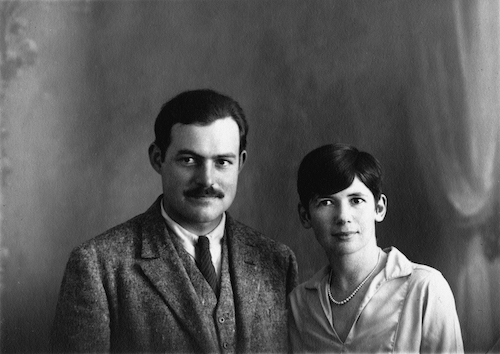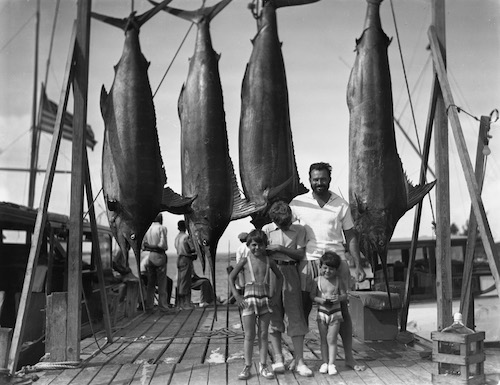Communiqué
Part three is the finale of “Hemingway” from Ken Burns and Lynn Novick, May 16 at 9 pm
< < Back toKen Burns and Lynn Novick’s HEMINGWAY to air Thursdays at 9 pm
Three-Part, Six-Hour Film Series Explores the Life and Work of the Legendary Writer and His Enduring Influence on Literature and Culture
Voice Actors Include Jeff Daniels as Hemingway; Meryl Streep, Keri Russell, Mary-Louise Parker and Patricia Clarkson as Hemingway’s Four Wives
Thursday, May 16 at 9 pm
Part Three: “The Blank Page” (1944-1961)
Hemingway follows the Army as they advance through Europe. Afterwards, he tries to start a life with Mary Welsh, but is beset with tragedies. He publishes The Old Man and the Sea to acclaim but is overcome by his declining mental condition.
**********************************************************************************************
Ernest Hemingway, the iconic literary figure considered one of the greatest American writers and among the first to live and work at the treacherous nexus of art and celebrity, is the subject of a three-part, six-hour documentary series directed by award-winning filmmakers Ken Burns and Lynn Novick (THE VIETNAM WAR, PROHIBITION, THE WAR).

The documentary paints an intimate picture of Hemingway the writer — who captured on paper the complexities of the human condition in spare and profound prose, and whose work remains deeply influential around the world — while also penetrating the myth of Hemingway the man’s man to reveal a deeply troubled and ultimately tragic figure. The film also explores Hemingway’s limitations and biases as an artist and a man of his time.
HEMINGWAY — written by Geoffrey C. Ward and produced by Sarah Botstein, both longtime collaborators of Burns and Novick — interweaves a close study of the biographical events of the author’s life with excerpts from his fiction, non-fiction and short stories, informed by interviews with celebrated writers, scholars and Hemingway’s son, Patrick. The filmmakers explore the painstaking process through which Hemingway created some of the most important works of fiction in American letters, including novels The Sun Also Rises, A Farewell to Arms, For Whom the Bell Tolls and The Old Man and the Sea; short stories “Hills Like White Elephants,” “The Short and Happy Life of Francis Macomber,” “Up in Michigan,” “Indian Camp” and “The Snows of Kilimanjaro;” as well as the nonfiction works Death in the Afternoon and A Moveable Feast.
“HEMINGWAY is both an intimate, turbulent family saga and an examination of some of the greatest works of American literature in the 20th century,” said director Ken Burns. “The documentary attempts to show how flawed our assumptions about Ernest Hemingway and his writing have been. At the same time, we are unsparing in our inquiry into less well-known aspects of his character and writing. Our intent is to offer viewers an honest portrayal of a complex and conflicted writer who left an indelible mark on literature.”
“In an era when Americans are re-evaluating so many icons, Hemingway is a particularly compelling figure to revisit,” said director Lynn Novick. “He was hugely complicated, deeply flawed, and he truly revolutionized the art of writing. One of the great revelations of this project was asking renowned writers from around the world — Mario Vargas Llosa, Edna O’Brien, Abraham Verghese, Leonardo Padura, Mary Karr — to share their insights into Hemingway’s work and why it’s still important today.”

Ernest Hemingway and Pauline Pfeiffer in Paris, France
Photographer unknown. Ernest Hemingway Collection. Photographs. John F. Kennedy Presidential Library and Museum, Boston
“One of the great challenges of this project,” said producer Sarah Botstein, “was finding ways — visually, cinematically — to show how Hemingway honed his craft and how he used words to such extraordinary effect. In collaboration with our editors, we deployed all the tools in our filmmaking toolbox — graphic effects, archival footage and photographs, live cinematography, sound effects — to make Hemingway’s work come fully alive on screen.”
“While many of us studied Ernest Hemingway in school, the true significance of his work was perhaps never fully appreciated. Through this extraordinary film, Ken, Lynn and Sarah have shed new light on the contributions and complexity of one of America’s most influential writers,” said Paula Kerger, President and CEO of PBS. “Public television continues to be a destination for thoughtful and thought-provoking biographies, and we are uniquely positioned to bring these important stories into the classroom through PBS LearningMedia.”
Ernest Hemingway “loved being in love,” the writer Michael Katakis says in the film. He married four times over the course of his tumultuous life and had three sons. His relationships with women — his mother, sisters, wives and the World War I nurse who broke his heart — profoundly affected his work. Yet for all his bravado and hyper-masculine posturing, Hemingway wrote about relationships between men and women with sensitivity, nuance and clarity. As writer Edna O’Brien says on camera, he was able to put himself “inside the skin” of the other and give voice to women’s deepest emotions.
Narrated by long-time collaborator Peter Coyote, the series features an all-star cast of actors bringing Hemingway (voiced by Jeff Daniels), his friends and family vividly to life. Through letters to and from his four wives — voiced by Meryl Streep, Keri Russell, Mary-Louise Parker and Patricia Clarkson — the film reveals Hemingway at his most romantic and his most vulnerable, grappling at times with insecurity, anxiety and existential loneliness.
“I’ve always admired Hemingway’s writing,” said Daniels. “The power of his simplicity changed literature. Reading his published work along with his unpublished letters gave me new insight into his impact as an artist and the ultimate tragedy of his life.”

Ernest Hemingway stands with sons on the docks at Bimini, Bahamas. (L-R) Patrick Hemingway, John “Bumby” Hemingway, Ernest Hemingway, and Gregory Hemingway.
Photographer unknown. Papers of Ernest Hemingway. Photograph Collection. John F. Kennedy Presidential Library and Museum, Boston
In three two-hour episodes, HEMINGWAY tracks the meteoric rise and tragic fall of the author who, in his final years, suffered from chronic alcoholism, serious mental illness, traumatic brain injuries and depression. In 1961, at the age of 61, Hemingway died by suicide, leaving behind an unparalleled body of artistic work and a complicated emotional legacy for those closest to him.
The filmmakers were granted unusually open access to the treasure trove of Hemingway’s manuscripts, correspondence, scrapbooks and photographs housed at the John F. Kennedy Presidential Library in Boston. Interviews with renowned biographers and scholars, including Mary Dearborn and Marc Dudley, shed new light on the man and his work; and well-known writers around the world — including Edna O’Brien, Abraham Verghese, Mario Vargas Llosa, Mary Karr, Tim O’Brien, Akiko Manabe, Leonardo Padura and Tobias Wolff — deepen the film’s exploration of Hemingway’s oeuvre. It also includes moving commentary from Hemingway’s surviving son, Patrick, and from the late Senator John McCain, whose lifelong role model was not Hemingway, but Robert Jordan, the protagonist of For Whom the Bell Tolls.
PBS LearningMedia, a free service that includes thousands of contextualized learning materials aligned to state and national standards, will offer a host of educational offerings for middle and high school teachers related to HEMINGWAY. Resources will include video clips, activities, discussion questions and lesson plans focusing on a range of topics relevant to English Language Arts, social studies, media literacy, and health teachers, and include suggestions for incorporating these materials into remote learning environments. PBS and WETA will also offer virtual professional learning opportunities for educators to help them navigate the resources and build the skills to bring topics related to Hemingway’s life and writing to life in their classrooms.
HEMINGWAY is a production of Florentine Films and WETA, Washington, D.C. Directed by Ken Burns and Lynn Novick, written by Geoffrey C. Ward, and produced by Burns, Novick and Sarah Botstein. Original music produced by Johnny Gandelsmen, with additional music created by longtime Florentine collaborator David Cieri.

